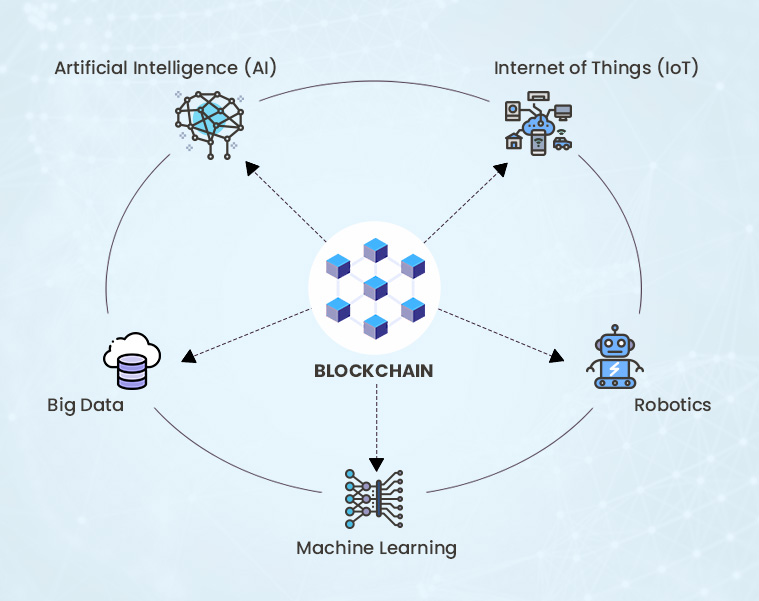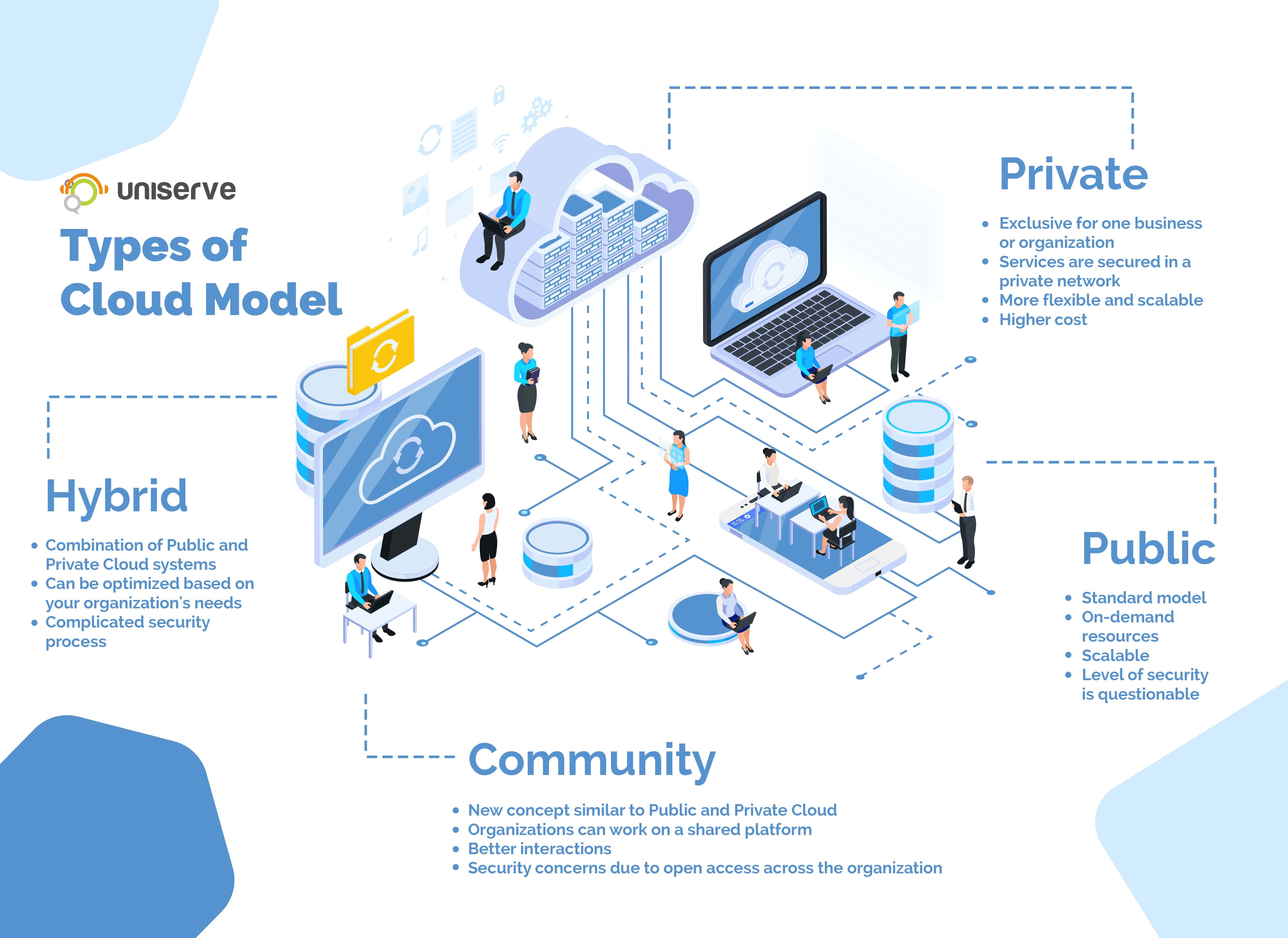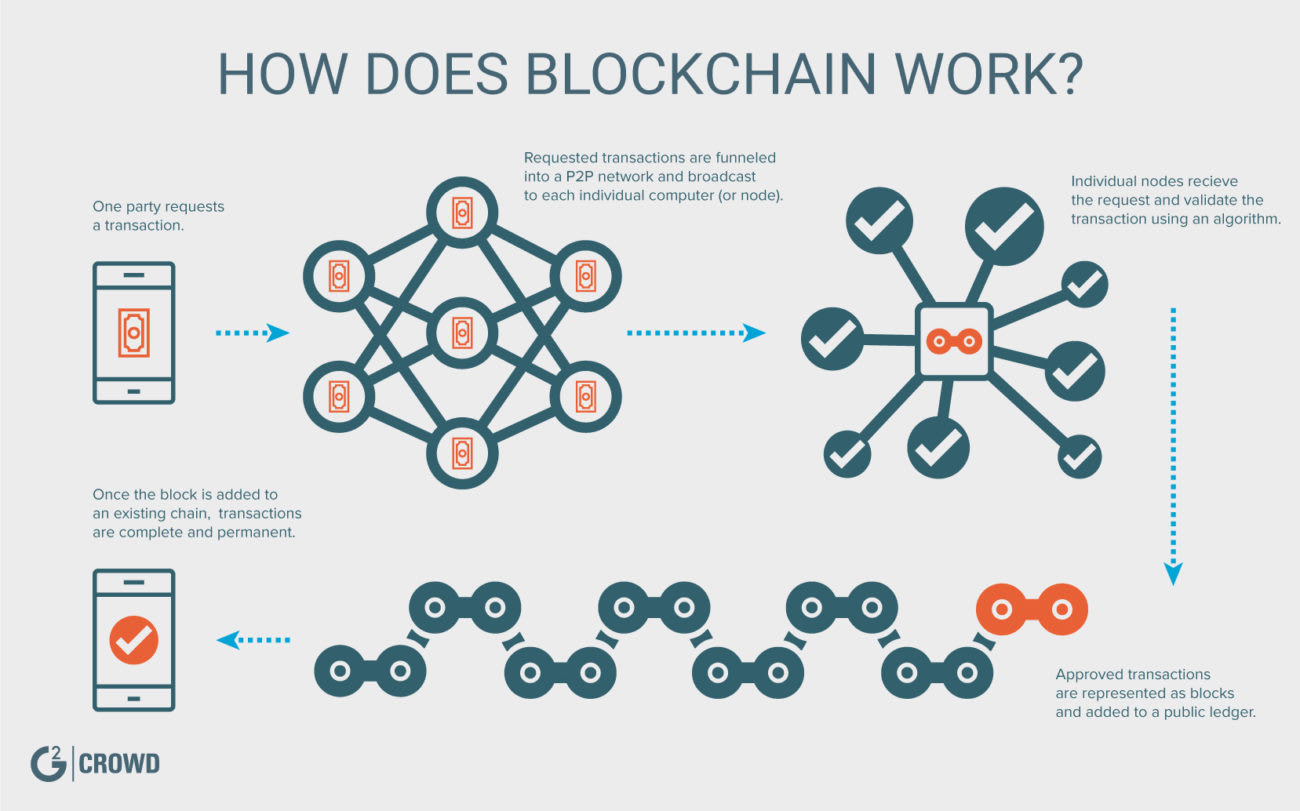Unraveling the Convergence of Blockchain and Cloud Computing
Blockchain technology has been gaining traction in various industries, thanks to its decentralized and secure nature. At its core, blockchain is a distributed ledger technology that enables secure and transparent record-keeping without the need for a central authority. Meanwhile, cloud computing has revolutionized the way organizations store, manage, and access data and applications, providing scalability, flexibility, and cost savings.
The convergence of blockchain and cloud computing has given rise to a new generation of cloud architectures that leverage the strengths of both technologies. Exploring blockchain in cloud architectures has the potential to create more secure, transparent, and efficient systems for data management, storage, and processing. This article will delve into the benefits and challenges of integrating blockchain technology with cloud infrastructures, as well as provide recommendations for successful adoption.
One of the primary benefits of integrating blockchain technology with cloud architectures is enhanced security and data integrity. By utilizing a decentralized and immutable ledger, organizations can ensure that their data is protected against unauthorized access, tampering, and fraud. This is particularly important in industries that handle sensitive information, such as healthcare, finance, and government.
Moreover, blockchain-based cloud architectures can improve data management and auditability, enabling organizations to track and verify the authenticity and integrity of their data throughout its lifecycle. This can lead to more efficient and accurate data-driven decision-making, as well as reduce the risk of errors, disputes, and compliance issues.

How Blockchain Strengthens Cloud Infrastructures
Blockchain technology has the potential to revolutionize cloud computing by enhancing data management, security, and auditability. By integrating blockchain with cloud architectures, organizations can leverage the strengths of both technologies to build more robust and efficient systems for data storage, processing, and sharing.
One of the primary use cases for blockchain in cloud computing is decentralized storage solutions. Traditional cloud storage systems rely on centralized servers and data centers, which can be vulnerable to single points of failure, data breaches, and downtime. Decentralized storage solutions, on the other hand, utilize a distributed network of nodes to store and manage data, providing enhanced security, availability, and scalability.
Decentralized storage solutions use blockchain technology to create a tamper-proof and auditable record of all data transactions and storage locations. This enables organizations to track and verify the authenticity and integrity of their data throughout its lifecycle, reducing the risk of errors, disputes, and compliance issues. Some of the leading decentralized storage platforms include Filecoin, Storj, and Sia.
Another use case for blockchain in cloud computing is blockchain-as-a-service (BaaS) platforms. BaaS platforms enable organizations to build and deploy blockchain applications and networks without the need for in-house expertise or infrastructure. BaaS platforms provide a range of features and functionalities, including smart contract development, consensus algorithms, and network management tools.
Some of the leading BaaS platforms include IBM Blockchain, Microsoft Azure Blockchain, and Amazon Managed Blockchain. These platforms provide a range of tools and services for building and deploying blockchain applications, as well as integrating with existing cloud infrastructures and services. By leveraging BaaS platforms, organizations can accelerate their blockchain adoption and innovation, while reducing the cost and complexity of building and managing their own blockchain networks.
In addition to decentralized storage and BaaS platforms, blockchain technology can be integrated into cloud infrastructures in a variety of ways, including:
- Decentralized identity and access management solutions, which enable users to securely manage and control their digital identities and access to resources and services.
- Decentralized computing and processing solutions, which utilize a distributed network of nodes to perform complex computations and processing tasks, providing enhanced performance, scalability, and cost savings.
- Decentralized data marketplaces and exchanges, which enable users to securely and transparently buy, sell, and trade data and insights, providing new revenue streams and value-added services.
In conclusion, blockchain technology has the potential to strengthen cloud infrastructures by improving data management, security, and auditability. By integrating blockchain with cloud architectures, organizations can leverage the strengths of both technologies to build more robust and efficient systems for data storage, processing, and sharing. As the convergence of blockchain and cloud computing continues to evolve, organizations should explore the potential benefits and opportunities of blockchain-based cloud solutions, and stay up-to-date with the latest developments and trends in the field.

Notable Blockchain-based Cloud Platforms
As blockchain technology continues to mature and gain widespread adoption, a growing number of blockchain-based cloud platforms have emerged, offering innovative solutions for data management, security, and auditability. Here are some of the leading platforms that organizations can explore for their blockchain-based cloud needs:
Chainstack
Chainstack is a blockchain-based cloud platform that provides a range of features and functionalities for building and deploying decentralized applications (DApps) and networks. Chainstack offers a user-friendly interface and a range of tools for managing nodes, networks, and smart contracts. Chainstack’s unique selling point is its focus on enterprise adoption, providing a range of services and support for businesses looking to leverage blockchain technology for their operations.
Blockstream
Blockstream is a blockchain-based cloud platform that specializes in satellite and sidechain technology. Blockstream’s satellite network enables users to access the Bitcoin blockchain from anywhere in the world, even in areas with limited or no internet connectivity. Blockstream’s sidechain technology enables organizations to build and deploy private blockchain networks, providing enhanced security and scalability for their data and transactions.
SONM
SONM is a decentralized platform for computing services, providing a range of features and functionalities for building and deploying distributed applications and networks. SONM’s unique selling point is its focus on fog computing, providing a decentralized network of nodes for computing and processing tasks, reducing the need for centralized servers and data centers. SONM’s platform enables users to rent out their computing power and resources, providing new revenue streams and value-added services.
In conclusion, exploring blockchain in cloud architectures provides organizations with a range of benefits, including enhanced security, data integrity, and auditability. By integrating blockchain technology with cloud infrastructures, organizations can leverage the strengths of both technologies to build more robust and efficient systems for data storage, processing, and sharing. As the convergence of blockchain and cloud computing continues to evolve, organizations should stay informed and proactive in exploring blockchain-based cloud solutions, building a strong blockchain and cloud competency within their organization, and collaborating with technology partners to stay ahead of the curve.

Challenges and Limitations of Blockchain-Cloud Integration
While the integration of blockchain technology with cloud architectures offers numerous benefits, there are also potential challenges and limitations that organizations should be aware of. Here are some of the key issues that organizations should consider when exploring blockchain-based cloud solutions:
Scalability
One of the main challenges of blockchain-cloud integration is scalability. Blockchain networks can be limited in their ability to handle large volumes of data and transactions, which can impact their performance and efficiency. Organizations should consider the scalability of blockchain networks when integrating them with cloud infrastructures, and look for solutions that can handle high volumes of data and transactions without compromising performance.
Regulatory Compliance
Regulatory compliance is another key challenge of blockchain-cloud integration. Blockchain technology is still relatively new and evolving, and regulatory frameworks are still being developed and refined. Organizations should ensure that their blockchain-based cloud solutions comply with relevant regulations and standards, and should work closely with regulatory bodies and legal experts to ensure compliance.
Interoperability Issues
Interoperability is a significant challenge in blockchain-cloud integration. Blockchain networks and cloud infrastructures can use different protocols, standards, and technologies, which can impact their compatibility and interoperability. Organizations should look for blockchain-based cloud solutions that are compatible with their existing infrastructure and can easily integrate with other systems and networks.
In conclusion, while blockchain-cloud integration offers numerous benefits, organizations should also be aware of the potential challenges and limitations. By conducting thorough risk assessments, partnering with experienced service providers, and prioritizing scalability, regulatory compliance, and interoperability, organizations can successfully adopt blockchain-based cloud solutions and leverage the strengths of both technologies to build more robust and efficient systems for data storage, processing, and sharing. As the convergence of blockchain and cloud computing continues to evolve, organizations should stay informed and proactive in exploring blockchain-based cloud solutions and building a strong blockchain and cloud competency within their organization.
Strategies for Successful Blockchain-Cloud Integration
Exploring blockchain in cloud architectures can offer numerous benefits, but organizations should also be aware of the potential challenges and limitations. Here are some strategies for successful blockchain-cloud integration:
Conduct Thorough Risk Assessments
Before adopting blockchain-based cloud solutions, organizations should conduct thorough risk assessments to identify potential vulnerabilities and threats. This includes evaluating the security measures of the blockchain network and cloud infrastructure, as well as assessing the regulatory and compliance risks associated with the technology. By identifying potential risks and threats, organizations can take proactive steps to mitigate them and ensure the security and integrity of their data.
Partner with Experienced Service Providers
Organizations should consider partnering with experienced service providers that have a proven track record in blockchain-cloud integration. Service providers with expertise in both blockchain technology and cloud computing can help organizations navigate the complexities of blockchain-cloud integration and ensure a successful deployment. By partnering with experienced service providers, organizations can leverage their expertise and resources to build more robust and efficient blockchain-based cloud solutions.
Prioritize User Experience and Adoption
User experience and adoption are critical factors in the success of blockchain-based cloud solutions. Organizations should prioritize user experience and adoption by designing solutions that are user-friendly, intuitive, and easy to use. This includes providing clear documentation, training, and support to help users understand and adopt the technology. By prioritizing user experience and adoption, organizations can increase user engagement and drive the successful adoption of blockchain-based cloud solutions.
In conclusion, organizations looking to adopt blockchain-based cloud solutions should conduct thorough risk assessments, partner with experienced service providers, and prioritize user experience and adoption. By following these strategies, organizations can successfully integrate blockchain technology with cloud architectures and leverage the strengths of both technologies to build more robust and efficient systems for data storage, processing, and sharing. As the convergence of blockchain and cloud computing continues to evolve, organizations should stay informed and proactive in exploring blockchain-based cloud solutions and building a strong blockchain and cloud competency within their organization.

The Future of Blockchain in Cloud Computing
As blockchain technology continues to mature and gain widespread adoption, its integration with cloud computing is becoming increasingly prevalent. Exploring blockchain in cloud architectures can offer numerous benefits, including enhanced security, data integrity, and improved data management. Here are some potential future developments and trends in blockchain-cloud integration:
Rise of Hybrid Blockchain-Cloud Models
Hybrid blockchain-cloud models, which combine the strengths of both public and private blockchain networks with cloud computing, are expected to become more popular in the future. These models can offer the benefits of both decentralized and centralized systems, such as improved scalability, security, and cost-efficiency. By leveraging the strengths of both technologies, organizations can build more robust and efficient systems for data storage, processing, and sharing.
Increasing Use of Smart Contracts
Smart contracts, which are self-executing contracts with the terms of the agreement directly written into code, are expected to become more widely used in blockchain-cloud integration. Smart contracts can automate complex business processes, reduce the need for intermediaries, and improve the speed and efficiency of transactions. By integrating smart contracts with cloud computing, organizations can build more intelligent and automated systems for data management, processing, and sharing.
Potential Impact of Regulatory Changes
Regulatory changes can have a significant impact on blockchain-cloud integration. As blockchain technology continues to mature, regulators are increasingly paying attention to its potential risks and benefits. Organizations should stay informed about regulatory developments and be prepared to adapt their blockchain-cloud strategies accordingly. By staying proactive and agile, organizations can ensure compliance with regulatory requirements and take advantage of new opportunities as they arise.
In conclusion, the future of blockchain in cloud computing is bright, with numerous potential developments and trends on the horizon. By exploring blockchain-cloud integration, organizations can leverage the strengths of both technologies to build more robust and efficient systems for data storage, processing, and sharing. As the convergence of blockchain and cloud computing continues to evolve, organizations should stay informed and proactive in exploring blockchain-based cloud solutions and building a strong blockchain and cloud competency within their organization.

Preparing for the Blockchain-Cloud Revolution
As blockchain technology continues to mature and gain widespread adoption, its integration with cloud computing is becoming increasingly prevalent. Exploring blockchain in cloud architectures can offer numerous benefits, including enhanced security, data integrity, and improved data management. To stay ahead of the curve, organizations should consider building a strong blockchain and cloud competency within their teams. Here are some strategies for preparing for the blockchain-cloud revolution:
Invest in Training and Development
Investing in training and development is essential for building a strong blockchain and cloud competency within your organization. By providing your team with the necessary knowledge and skills, you can ensure that they are well-equipped to explore blockchain-based cloud solutions and make informed decisions about their implementation. Consider offering training programs, workshops, and certifications to help your team stay up-to-date with the latest developments in blockchain technology and cloud computing.
Attend Industry Events
Attending industry events is a great way to stay informed about the latest trends and developments in blockchain-cloud integration. Consider attending conferences, meetups, and webinars to learn from experts in the field and connect with other professionals who are exploring blockchain-based cloud solutions. By staying engaged with the blockchain and cloud community, you can gain valuable insights and ideas that can help your organization stay ahead of the curve.
Collaborate with Technology Partners
Collaborating with technology partners is a great way to explore blockchain-based cloud solutions and build a strong blockchain and cloud competency within your organization. Consider partnering with experienced service providers who specialize in blockchain technology and cloud computing. By working with experts in the field, you can gain access to the latest tools, technologies, and best practices for integrating blockchain with cloud architectures. Additionally, you can benefit from their expertise and experience, which can help you avoid common pitfalls and accelerate your blockchain-cloud journey.
In conclusion, preparing for the blockchain-cloud revolution is essential for organizations looking to stay ahead of the curve and leverage the strengths of both technologies. By investing in training and development, attending industry events, and collaborating with technology partners, organizations can build a strong blockchain and cloud competency and explore blockchain-based cloud solutions with confidence. As the convergence of blockchain and cloud computing continues to evolve, organizations should stay informed and proactive in exploring blockchain-based cloud solutions and building a strong blockchain and cloud competency within their teams.

